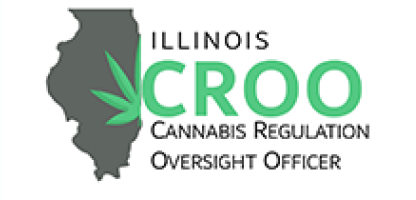Meet the Cannabis Team
In 2019, Illinois became the 11th state to legalize cannabis for adult (recreational) use, having already legalized cannabis for medical use in 2013. Recognizing the harmful effects of punitive drug policies on communities across Illinois and nationally, Illinois was the first state to integrate comprehensive equity measures in its legalizing statute. These measures comprise the three pillars of the Illinois cannabis program: diversity at all levels of the cannabis industry, criminal history record expungement, and reinvestment in communities most harmed by the failed War on Drugs.
There are several agencies involved in the regulation and taxation of cannabis in Illinois. You can learn about the role each agency plays below. The Cannabis Regulation Oversight Office coordinates all the State agencies regulating and taxing cannabis and promotes diversity and equity throughout.
Cannabis Regulation Oversight Office (CROO)
The Cannabis Regulation Oversight Office (CROO) coordinates among all agencies involved in the direct regulation and taxation of Illinois' cannabis industry, while promoting effective policies to ensure diversity and equity. Among other things, the CROO is responsible for commissioning and publishing a disparity and availability study by March 1, 2021. Specifically, the study shall evaluate whether there exists discrimination in the State’s cannabis industry and if so, evaluate the impact of such discrimination and make recommendations for reducing or eliminating any identified barriers to entry in the cannabis market. 410 ILCS 5/45(e).
The CROO also has explicit authority to collect information from the cannabis industry on an annual basis to “allow it to assess the extent of diversity in the medical and adult use cannabis industry” and designate information that must be provided by conditional adult use dispensing organization license applicants on the application to facilitate the disparity and availability study. 410 ILCS 705/7-30.
The CROO is statutorily authorized to, among other things,
Make recommendations for administrative and statutory changes;
Collect data both in Illinois and outside Illinois regarding regulation of cannabis;
Compile or assist in the compilation of any reports required by the Cannabis Regulation and Tax Act;
Ensure the coordination of efforts between various State agencies involved in regulating and taxing the sale of cannabis in Illinois; and
Encourage, promote, suggest, and report best practices for ensuring diversity in the cannabis industry in Illinois.
The CROO is statutorily prohibited from:
Participating in the issuance or award of any cannabis business establishment license or
Participating in discipline related to any cannabis business establishment.
Executive Staff:
Erin Johnson, Cannabis Regulation Oversight Officer
Kirsten Davis-Franklin, Deputy CROO for Policy and Legislation
Solomon Hatch, Deputy CROO for Administration
Nathaniel Inglis Steinfeld, Deputy CROO for Research and Data
Department of Agriculture
The Department of Agriculture (IDOA) licenses and regulates cultivation centers, craft growers, infusers, transporters, and their agents. The Department also oversees the Community College Cannabis Vocational Training Pilot Program and community colleges licensed within that program.
Department of Financial and Professional Regulation
The Department of Financial and Professional Regulation (IDFPR) licenses and regulates medical and adult use dispensaries and their agents. The Department also oversees the Responsible Vendor Training program, required training for all agents, and administratively supports the CROO.
Department of Public Health
The Department of Public Health (IDPH) regulates the registration of medical cannabis patients and their caregivers, as well as the Opioid Alternative Pilot Program. The Department also issues food, health, and safety standards for all cannabis-infused products produced in Illinois. The Department also co-chairs the Adult Use Cannabis Health Advisory Committee.
Department of Commerce and Economic Opportunity
The Department of Commerce and Economic Opportunity (DCEO) administers Illinois’ loan program for social equity cannabis business license holders. The Department is also responsible for providing pre- and post-licensing technical assistance through third-party service providers.
Illinois State Police
The Illinois State Police (ISP) conduct background checks of all applicants, cannabis business owners, and prospective agents. The Department also conducts inspections and security reviews of all licensed cannabis business facilities.
Department of Human Services
The Department of Human Services (DHS) receives 20% of all adult use cannabis tax revenue to distribute to organizations providing mental health, trauma, and substance use disorder treatment. The Department is also responsible for public education and public health evaluations surrounding cannabis use in Illinois. The Department co-chairs the Adult Use Cannabis Health Advisory Committee.
Illinois Criminal Justice Information Authority
The Restore, Reinvest, and Renew (R3) Program, overseen by the Illinois Criminal Justice Information Authority (ICJIA), receives 25% of all adult use cannabis tax revenue to address economic development, violence prevention services, re-entry services, youth development, and civil legal aid.
Cannabis Expungement Fund Partners
A portion of the adult use cannabis tax revenue goes towards facilitating the processing of expungement petitions for Minor Cannabis Offenses. 30 ILCS 105/6z-112(c)(2).
Administrative Office of the Illinois Courts
Office of the Attorney General
State’s Attorneys’ Offices
Civil legal aid
Illinois State Police

